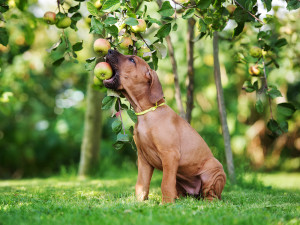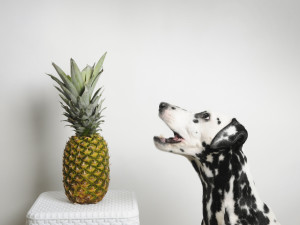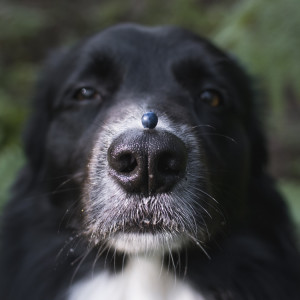Can Dogs Eat Raspberries?
They sure would like some of your farmers’ market haul.

Share Article
Aside from getting those teeny seeds stuck in your teeth, raspberries are one of nature’s most perfect sweet treats, and on top of being delicious, they are packed with amazing nutrients. Can your dog indulge in a raspberry snack, too? Yes, they can.
Raspberries are safe and healthy for dogs in moderation and can provide some excellent health benefits for them as well. Read on to learn more about all this superfood has to offer for your dog.
Nutrition facts about raspberries for dogs
The raspberry is the fruit of the Rubus idaeus plant, also known as the American red raspberry. This plant is in the Rosaceae family and produces small delicious red fruits that can be eaten raw as well as cooked. Raspberries are a food source for many wild animals and the nectar from its flowers also attract pollinators, like bees and butterflies.
Although the fruits are small, they are packed with incredible nutrients. Raspberries are known as antioxidant powerhouses due to a unique combination of polyphenols in the fruits. This is in addition to being high in fiber and full of vital vitamins and minerals.

Are raspberries good for dogs?
Overall, yes, raspberries are a healthy snack for dogs in moderation. Here are some of the health benefits raspberries provide:
Low in sugar: OK, we know sugar isn’t good for dogs, but small amounts of sugar serve as an energy source and can be beneficial for highly active dogs. Plus, raspberries are actually comparatively low in sugar compared to most other fruits, making them a better choice for our dogs.
Fiber: Raspberries are a very high-fiber food and contain both soluble and insoluble forms of fiber. This means that they help add bulk to a pup’s stool, which can prevent constipation and help dogs feel full without adding lots of calories. Soluble fiber is also an important nutrient source for the good bacteria in the gut, known as the microbiome.
Polyphenols: Raspberries have a unique combination of anthocyanin and ellagitannin, plant compounds that are being studied for their beneficial properties including anti-inflammatory effects, antioxidant properties, and helpful effects on metabolism.
Vitamins and minerals: Raspberries also contain magnesium, calcium, potassium, Vitamin K, and iron; all of which are critical to normal cell function. Your dog gets adequate amounts of these through their diet, as long as it is a complete and balanced dog food diet. Anything they get from raspberries and other snacks are a great bonus.
Can dogs eat all parts of the raspberry plant?
While the plant and fruit are considered non-toxic to dogs, there are a few good reasons your dog should not eat raspberry plants. The first is that the plant is very fibrous and the leaves and stem cannot be digested. If your dog eats a lot of plant matter, this will lead to digestive upset including vomiting, gas, or diarrhea.
Also, the leaves of the raspberry plant are known to have effects on pregnant animals and humans, leading to uterine contractions and possibly causing preterm labor and delivery. In fact, these leaves have been used historically in traditional medicine for people with conditions including pregnancy, menstrual cramps, and more. So, if you happen to have a pregnant dog, they should not ingest raspberry leaves.
Are raspberries completely safe for dogs?
Raspberries are a safe and healthy snack for dogs in moderation. There are a few factors to consider if you plan to share raspberries with your pup:
High in fiber: While fiber is a very healthy and important part of your dog’s diet, too much fiber can lead to unpleasant side effects, especially if your dog is not used to lots of fiber. Large amounts of fiber can cause gas, cramps, and even diarrhea. Start slowly at first with just one or two raspberries, and see how your dog handles it.
Xylitol content: Surprisingly, raspberries actually contain a very small amount of xylitol. This is a known toxin for dogs and is sometimes used as an artificial sweetener in sugar-free foods. Thankfully, the amount found in raspberries is really too small to cause any problems. For example, a 10-pound dog would need to eat about 20 cups of raspberries to experience toxic effects. Unless your dog really goes on a raspberry bender, they should be fine with eating the occasional snack-sized portion of raspberries.
Sugar content: Raspberries are very low in sugar compared to other fruits, making them a good choice for the occasional snack. However, some dogs, such as diabetic dogs, need to be on especially low-sugar diets or dogs who are already overweight. Be sure to factor in all snacks and table scraps when considering your dog’s overall caloric intake and keep sweet snacks to a minimum.
The bottom line: Can dogs eat human food?
Dogs can eat human food and of course, we know that they do from time to time, whether we share it intentionally or not. However, it is important to ensure that the bulk of their daily diet comes from a complete and balancedopens in new tab dog food that will provide all the nutrients they really need.
This protects them against nutritional deficiencies that can lead to serious health problems. It also helps to keep them at a healthy weight. By minimizing snacks and table treats to less than 10 percent of their diet and feeding them an appropriate portion of dog food, you can prevent overfeeding which can lead to weight gain and other related health problems like diabetes and arthritis.
Of course, we all love to share the occasional snack with our dogs and check out their reactions to new foods, so there are ways to indulge your pet while keeping their health in mind. Be sure that any foods you plan to share are safe and non-toxic to dogs, and avoid any foods that may contain unhealthy ingredients. If in doubt, speak with your vet or a pet poison hotline before sharing a questionable food with your pup. And finally, use the opportunity of sharing a delicious treat with your dog to reinforce good behaviors and training cues. Ask your dog to sit, wait, or go to their mat or crate before receiving a treat. This allows you to continually reinforce those good habits while also spoiling your pup at the same time.
Other foods that are safe for dogs
Mangoes can be a sweet treat in small amounts.
Broccoli can be a healthy snack, too.
Apples are another good choice for a high-fiber, crunchy treat.
Other foods that are dangerous for dogs
Grapes and raisins are toxic to dogs and should never be shared.
Chocolate and these other foods are also toxic and should be kept out of reach.
Avoid avocados, too, when it comes to your pup.
FAQs (People also ask)
How many raspberries can a dog eat?
Raspberries are high in fiber and may cause digestive upset in large amounts. Start with one or two raspberries in a sitting and see how your dog reacts.
Is it OK to give dogs raspberries?
Yes, raspberries are safe for dogs to eat in moderation.
Why do dogs like raspberries?
Dogs may like the sweet taste and the chewy texture of raspberries.
Can dogs eat raspberry seeds?
The seeds within the raspberry fruit are safe for dogs to eat. They are high in fiber so dogs should eat small servings of raspberries.
Are raspberry leaves safe for dogs?
The leaves are nontoxic but can cause digestive upset and are not safe for pregnant dogs to eat.
References

Dr. Amy Fox, DVM
Amy Fox, DVM is a small animal veterinarian in New York City with over thirteen years of experience in a mixture of general practice, emergency medicine, and shelter medicine. A lifelong animal lover, Dr. Fox studied biology in college and then worked as a veterinary nurse before pursuing veterinary school at Cornell University. Her expertise includes surgery, dentistry, and management of chronic conditions, and she is interested in toxicology, pain management, nutrition, care of senior pets, and educational outreach. Dr. Fox also enjoys writing about veterinary medicine and teaching, and her work has previously appeared in Spruce Pets. In her free time, she loves to cook, garden, go for long runs, and hang out with her goofy mixed-breed dog May, who provides never ending comic relief!
Related articles
![Ridgeback puppy eating an apple from a low-hanging tree]()
Can Dogs Eat Apples?
Here’s why this fiber-filled fruit is a healthy treat for your dog.
Can Dogs Eat Pineapple?
Pineapple is a healthy, sweet treat for dogs—as long as you feed it to your pup in moderation.
![A close up view of a dog with a blueberry resting on its nose]()
Can Dogs Eat Blueberries?
Yep—blueberries are a fiber and antioxidant-packed snack for your pup.
Can My Dog Eat Bananas?
Yep — bananas are a healthy and delicious treat for your pup.
Can Dogs Eat Strawberries?
In moderation, strawberries are a tasty, healthy treat for your pup.
Can Dogs Eat Peaches?
It’s the best fruit of the season, after all.









